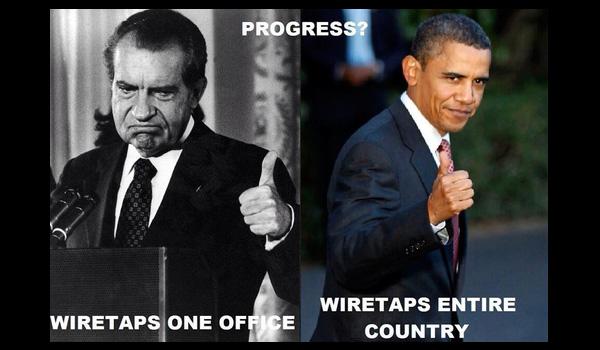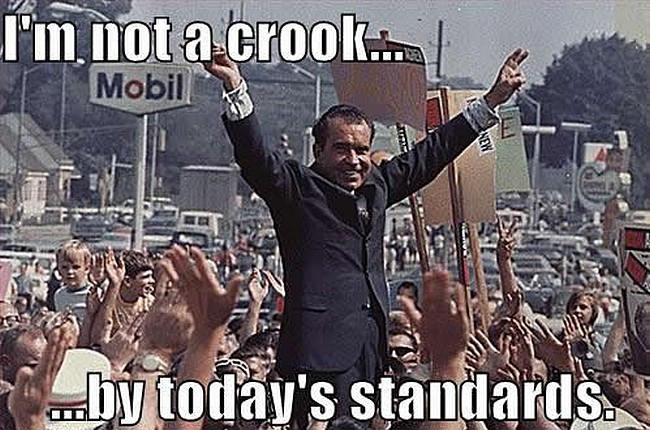It looks like you're using an Ad Blocker.
Please white-list or disable AboveTopSecret.com in your ad-blocking tool.
Thank you.
Some features of ATS will be disabled while you continue to use an ad-blocker.
share:
Are there impeachable offences directly related, or indirectly related?
Let’s take a time travel back to the year 1972 to our former president Richard Nixon, and the Watergate, impeachment, and corruption.
So what happened back then to get the impeachment rolling? And why wasn’t he impeached?
en.wikipedia.org...
Are there any familiar or parallel circumstances today?
www.history.com...
In conclusion, this topic was not to point any fingers, but to see if there is any justification for president Obama to be impeached, since there seems to be so much tension related to this topic.
Let’s hear everyone’s thoughts and logic on this and please be civil.
Let’s take a time travel back to the year 1972 to our former president Richard Nixon, and the Watergate, impeachment, and corruption.
So what happened back then to get the impeachment rolling? And why wasn’t he impeached?
en.wikipedia.org...
“The term Watergate has come to encompass an array of clandestine and often illegal activities undertaken by members of the Nixon administration. Those activities included "dirty tricks," or bugging the offices of political opponents and the harassment of activist groups and political figures. The activities were brought to light after five men were caught breaking into Democratic party headquarters at theWatergate complex in Washington, D.C. on June 17, 1972. The Washington Post picked up on the story; reporters Carl Bernstein and Bob
Woodward relied on an informant known as "Deep Throat"—later revealed to be Mark Felt, associate director at the FBI—to link the men to the Nixon administration. Nixon downplayed the scandal as mere politics, calling news articles biased and misleading. A series of revelations made it clear that the Committee to Re-elect President Nixon, and later the White House, was involved in attempts to sabotage the Democrats. Senior aides such as White House Counsel John Dean faced prosecution; in total 48 officials were convicted of wrongdoing.”
Are there any familiar or parallel circumstances today?
www.history.com...
Nixon vigorously denied involvement in the burglary cover-up, most famously in November 1973 when he declared, "I am not a crook." Although Nixon released some of the tapes requested by the Senate in April 1974, he withheld the most damning of them, claiming executive privilege. On July 24, 1974, the Supreme Court rejected Nixon's claim of executive privilege and ordered him to turn over the remaining tapes
When he refused to do so, the House of Representatives passed the first article of impeachment against Nixon for obstruction of justice. On August 5, with the impeachment process already underway, Nixon reluctantly released the remaining tapes.
On August 8, 1974, Nixon avoided a Senate trial and likely conviction by becoming the first president to resign.
In conclusion, this topic was not to point any fingers, but to see if there is any justification for president Obama to be impeached, since there seems to be so much tension related to this topic.
Let’s hear everyone’s thoughts and logic on this and please be civil.
edit on 29-7-2014 by Realtruth because: (no reason given)
It'll take 67 votes in the Senate. That's not gonna happen. Why put the country through that?
Now, if the snowball had a chance in Hell ... I'd say, "Go for it."
Truth be told, I don't altogether understand the politics of impeachment. This is One time I think it's better to leave such a decision to the politicians.
Good OP!!
-Cheers
Now, if the snowball had a chance in Hell ... I'd say, "Go for it."
Truth be told, I don't altogether understand the politics of impeachment. This is One time I think it's better to leave such a decision to the politicians.
Good OP!!
-Cheers
Why don't we use President Andrew Johnson instead? He was impeached for removing the Secretary of War from his own Cabinet, which broke the Tenure of
Office Act.
National Park Service
In the end, it was all political.
The President was right, in that the Tenure of Office Act was held by the Court to be invalid.
Before Abraham Lincoln was assassinated in 1865, he had formulated a plan of reconstruction that would be lenient toward the defeated South as it rejoined the Union. He planned to grant a general amnesty to those who pledged an oath of loyalty to the United States and agreed to obey all federal laws pertaining to slavery (though high-ranking Confederate officials and military leaders were to be excluded from the general amnesty).
Lincoln's plan also stated that when a tenth of the voters who had taken part in the 1860 election had agreed to the oath within a particular state, then that state could formulate a new government and start sending representatives to Congress. Andrew Johnson was intent on carrying out this plan when he assumed the presidency. This policy, however, did not sit well with the so-called Radical Republicans in Congress, who wanted to set up military governments and implement more stringent terms for readmission for the seceded states. As neither side was willing to compromise, a clash of wills ensued.
The political backing to begin impeachment proceedings against the president came when Johnson breached the Tenure of Office Act by removing Edwin Stanton, Secretary of War, from the cabinet. The Tenure of Office Act, passed over Johnson's veto in 1867, stated that a president could not dismiss appointed officials without the consent of Congress.
Both Lincoln and Johnson had experienced problems with Stanton, an ally of the Radicals in Congress. Stanton's removal, therefore, was not only a political decision made to relieve the discord between the president and his cabinet, but a test of the Tenure of Office Act as well. Johnson believed the Tenure of Office Act was unconstitutional and wanted it to be legally tried in the courts. It was the president, himself, however, who was brought to trial. President Johnson was impeached by the House of Representatives on February 24, 1868 and the Senate tried the case in a trial that lasted from March to May 1868. In the end, the Senate voted to acquit President Andrew Johnson by a margin of 35 guilty to 19 not guilty - one vote short of the two-thirds needed to convict.
In a 1926 case, the Supreme Court declared that the Tenure of Office Act had been invalid. Experience More Parks Andrew Johnson National Historic Site Topics Andrew Johnson National Historic Site - Impeachment Time Line PBS American Experience - The Impeachment of Andrew Johnson
National Park Service
In the end, it was all political.
The President was right, in that the Tenure of Office Act was held by the Court to be invalid.
edit on
bu312014-07-29T11:32:06-05:0011America/ChicagoTue, 29 Jul 2014 11:32:06 -050011u14 by butcherguy because: (no reason given)
edit on
b000000312014-07-29T11:48:23-05:0011America/ChicagoTue, 29 Jul 2014 11:48:23 -05001100000014 by butcherguy because: Broke down wall of text into
paragraphs.
the question is not 'should he get impeached'
the question is "Can" he be impeached...
I allude to the evidence that he had an earlier Oath to the Muslim faith (look up about that ring he wears that is inscribed with devotion to Allah)
and the Muslim Brotherhood membership oath which according to many sources those Two Oaths
are Superior to that of an ordinary Oath-of-Office that an elected office holder takes
You, Congress or even SCOTUS would be hard pressed to do a flanking action to get around both Holder and Obama impeachment stonewall
the question is "Can" he be impeached...
I allude to the evidence that he had an earlier Oath to the Muslim faith (look up about that ring he wears that is inscribed with devotion to Allah)
and the Muslim Brotherhood membership oath which according to many sources those Two Oaths
are Superior to that of an ordinary Oath-of-Office that an elected office holder takes
You, Congress or even SCOTUS would be hard pressed to do a flanking action to get around both Holder and Obama impeachment stonewall
edit on
th31140665184529372014 by St Udio because: ring on finger
a reply to: Realtruth
The only ones I know of pushing hard for impeachment, is the White House it's self. As a political ploy to rally the weak Democratic base to defend Obama. They are using every trick in the book in attempts to make the opposing parties look like they are attacking their leader.
It would be the worst possible banner and rally cry for the Republicans to take up at this time. I think enough Republicans are aware of this and will sidestep the issue, as they are looking at gaining the Senate in the November elections.
Des
The only ones I know of pushing hard for impeachment, is the White House it's self. As a political ploy to rally the weak Democratic base to defend Obama. They are using every trick in the book in attempts to make the opposing parties look like they are attacking their leader.
It would be the worst possible banner and rally cry for the Republicans to take up at this time. I think enough Republicans are aware of this and will sidestep the issue, as they are looking at gaining the Senate in the November elections.
Des
Only if you promise to impeach all the other criminal politicians. To believe that Obama is any more or less culpable to whatever today's alleged
crimes happen to be than any of the rest of them is laughable and naïve. It's a crime syndicate. The whole thing needs to go.
a reply to: butcherguy
Nice. I didn't forget about him. Star for you.
I just did not want to dilute my OP and I figured some savvy ATS member would instantly bring it up and then, "Presto!".
Can you break that quoted info down into more readable paragraphs?
Thanks
RT
Nice. I didn't forget about him. Star for you.
I just did not want to dilute my OP and I figured some savvy ATS member would instantly bring it up and then, "Presto!".
Can you break that quoted info down into more readable paragraphs?
Thanks
RT
a reply to: Realtruth
Nixon was like half a step away from disbanding the office of the "Prez" and declaring himself dictator... Not to mention the whole megalomania deal he had going
Obama is no Nixon... his is more like a Lackey than an 'Evil Master Mind'... His staff tells him what to do so if you want real change... Impeach the staff...
Nixon was like half a step away from disbanding the office of the "Prez" and declaring himself dictator... Not to mention the whole megalomania deal he had going
Obama is no Nixon... his is more like a Lackey than an 'Evil Master Mind'... His staff tells him what to do so if you want real change... Impeach the staff...
edit on 29-7-2014 by HardCorps because: (no reason given)
a reply to: Realtruth
I say "YES"!
Then again, "What good would it do?"!
Give the American sponges more hope that our government will get better and finally do it's job? IE represent those they should work for and NOT those whom funnel them funds for their elections?
Who will replace him? Another puppet with the fist of the military/industrial complex with their hand shoved so far up in them that they do nothing more than create false hope and continue to push for full globalization towards their utopian "one world government"?
Bottom line, it wouldn't make any difference if Obama was impeached! Politicians are like drug dealers! You take one off the street and there are hundreds more lined up to take their place......
Just my two cents.
I say "YES"!
Then again, "What good would it do?"!
Give the American sponges more hope that our government will get better and finally do it's job? IE represent those they should work for and NOT those whom funnel them funds for their elections?
Who will replace him? Another puppet with the fist of the military/industrial complex with their hand shoved so far up in them that they do nothing more than create false hope and continue to push for full globalization towards their utopian "one world government"?
Bottom line, it wouldn't make any difference if Obama was impeached! Politicians are like drug dealers! You take one off the street and there are hundreds more lined up to take their place......
Just my two cents.
My understanding is that impeachment is simply an investigation to see if there was any wrongdoing, so why not?
If anyone else is accused of wrongdoing, there is an investigation, and if there is sufficient evidence, a trial. If no wrongdoing can be proven, then so be it. This process is good enough for every other American, so why not the President?
If anyone else is accused of wrongdoing, there is an investigation, and if there is sufficient evidence, a trial. If no wrongdoing can be proven, then so be it. This process is good enough for every other American, so why not the President?
Can Obama be impeached ?
Yep
First they were like all:

If Obama was held to the SAME standard:

He would be impeached.
Yep
First they were like all:

If Obama was held to the SAME standard:

He would be impeached.
originally posted by: Realtruth
a reply to: butcherguy
Nice. I didn't forget about him. Star for you.
I just did not want to dilute my OP and I figured some savvy ATS member would instantly bring it up and then, "Presto!".
Can you break that quoted info down into more readable paragraphs?
Thanks
RT
It is done.
Sorry about the wall of text... I hate that too.
Even if he could be impeached, I doubt he would be. Congress is worthless.
originally posted by: butcherguy
a reply to: HardCorps
Nixon was like half a step away from disbanding the office of the "Prez" and declaring himself dictator.
I remember listening to some of the Watergate Hearings as a kid.
I don't remember this though.
Okay so maybe I'm prone to Hyperbole...
But come on now... the people he had working for him behind the scenes and not just the WaterGate deal...
He was headed down that road threw his sheer arrogance...
There's no point in impeaching him. Biden will continue King Obama's campaign...
Keep the ignorant masses discussing & debating over issues... so they don't realize they've already been deceived! You people fit that description.
Anyone interested... or are you afraid you might discover the truth?
You have already accepted the number & mark of the beast. I don't make claims this huge without proof to back them up.
Anyone interested... or are you afraid you might discover the truth?
edit on 07-27-2016 by IXApollyonXI because: (no reason
given)
new topics
-
Matthew Livelsberger said he was being followed by FBI
Political Conspiracies: 2 hours ago -
How the Sikhs Deal with Muslim Grooming Gangs – Tommy Robinson
Social Issues and Civil Unrest: 4 hours ago -
Paranoid Liberals Believe U.S. Service Members are More Dangerous than Illegal Aliens.
Social Issues and Civil Unrest: 5 hours ago -
The 119th Congress has Officially Opened for Business
Mainstream News: 6 hours ago -
Here we again... CHINA having mass outbreak of something
Diseases and Pandemics: 6 hours ago -
Flee from idolatry
Religion, Faith, And Theology: 11 hours ago -
FIEND SLASHED: Sara Sharif’s killer dad ‘has neck & face sliced open with jagged tuna tin lid
Mainstream News: 11 hours ago
top topics
-
Musk calls on King Charles III to dissolve Parliament over Oldham sex grooming gangs
Mainstream News: 12 hours ago, 14 flags -
Matthew Livelsberger said he was being followed by FBI
Political Conspiracies: 2 hours ago, 12 flags -
The Why Files Lacerta Reveals the Truth of our Creation
Aliens and UFOs: 13 hours ago, 11 flags -
FIEND SLASHED: Sara Sharif’s killer dad ‘has neck & face sliced open with jagged tuna tin lid
Mainstream News: 11 hours ago, 10 flags -
Grenfell Tower Fire revisited
Mainstream News: 13 hours ago, 9 flags -
The 119th Congress has Officially Opened for Business
Mainstream News: 6 hours ago, 7 flags -
Here we again... CHINA having mass outbreak of something
Diseases and Pandemics: 6 hours ago, 6 flags -
Paranoid Liberals Believe U.S. Service Members are More Dangerous than Illegal Aliens.
Social Issues and Civil Unrest: 5 hours ago, 5 flags -
How the Sikhs Deal with Muslim Grooming Gangs – Tommy Robinson
Social Issues and Civil Unrest: 4 hours ago, 4 flags -
Flee from idolatry
Religion, Faith, And Theology: 11 hours ago, 3 flags
active topics
-
Matthew Livelsberger said he was being followed by FBI
Political Conspiracies • 21 • : SteamyAmerican -
Flee from idolatry
Religion, Faith, And Theology • 7 • : FullHeathen -
Tesla Cybertruck Explodes in Front of Trump Hotel in Las Vegas
Mainstream News • 185 • : cherokeetroy -
Candidate TRUMP Now Has Crazy Judge JUAN MERCHAN After Him - The Stormy Daniels Hush-Money Case.
Political Conspiracies • 2170 • : xuenchen -
Yale law professor says Trump isn’t a convicted felon despite guilty verdict
US Political Madness • 45 • : xuenchen -
Paranoid Liberals Believe U.S. Service Members are More Dangerous than Illegal Aliens.
Social Issues and Civil Unrest • 19 • : Athetos -
Elon Musk Calls for Tommy Robinson to be Freed - and Takes a Dig at Starmer
Politicians & People • 18 • : gortex -
The Acronym Game .. Pt.4
General Chit Chat • 1034 • : JJproductions -
-@TH3WH17ERABB17- -Q- ---TIME TO SHOW THE WORLD--- -Part- --44--
Dissecting Disinformation • 3918 • : fringeofthefringe -
Musk calls on King Charles III to dissolve Parliament over Oldham sex grooming gangs
Mainstream News • 85 • : DontTreadOnMe

